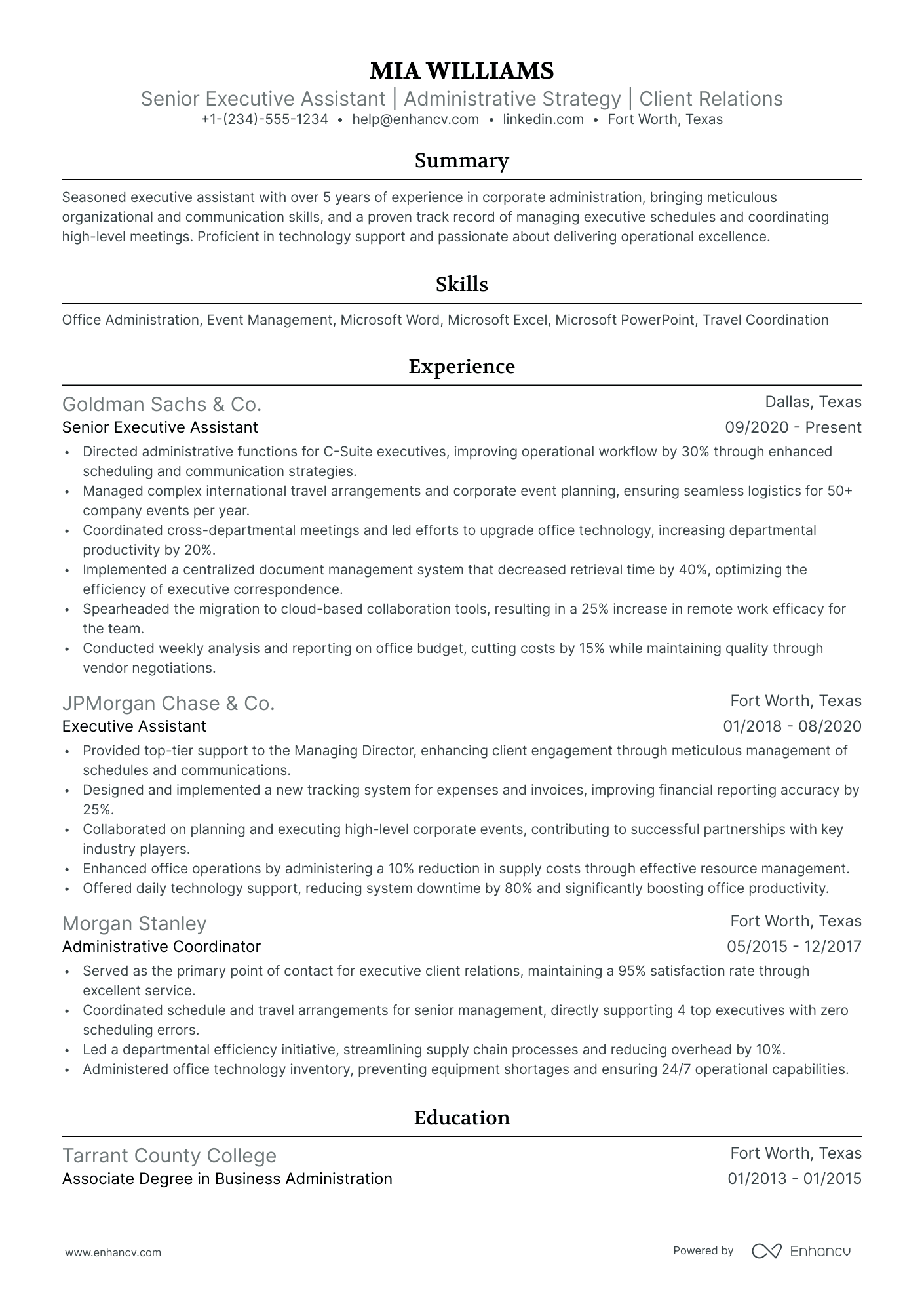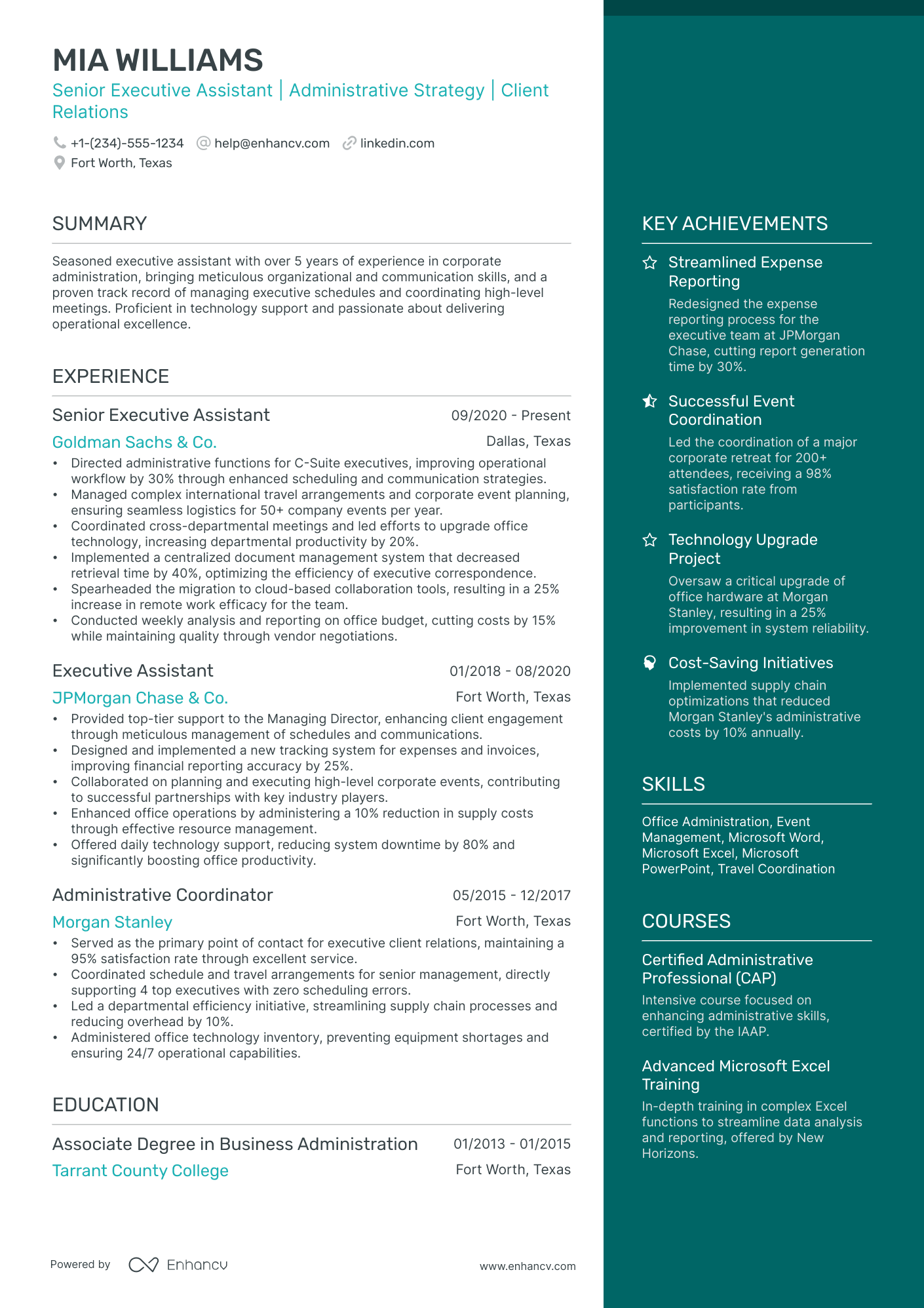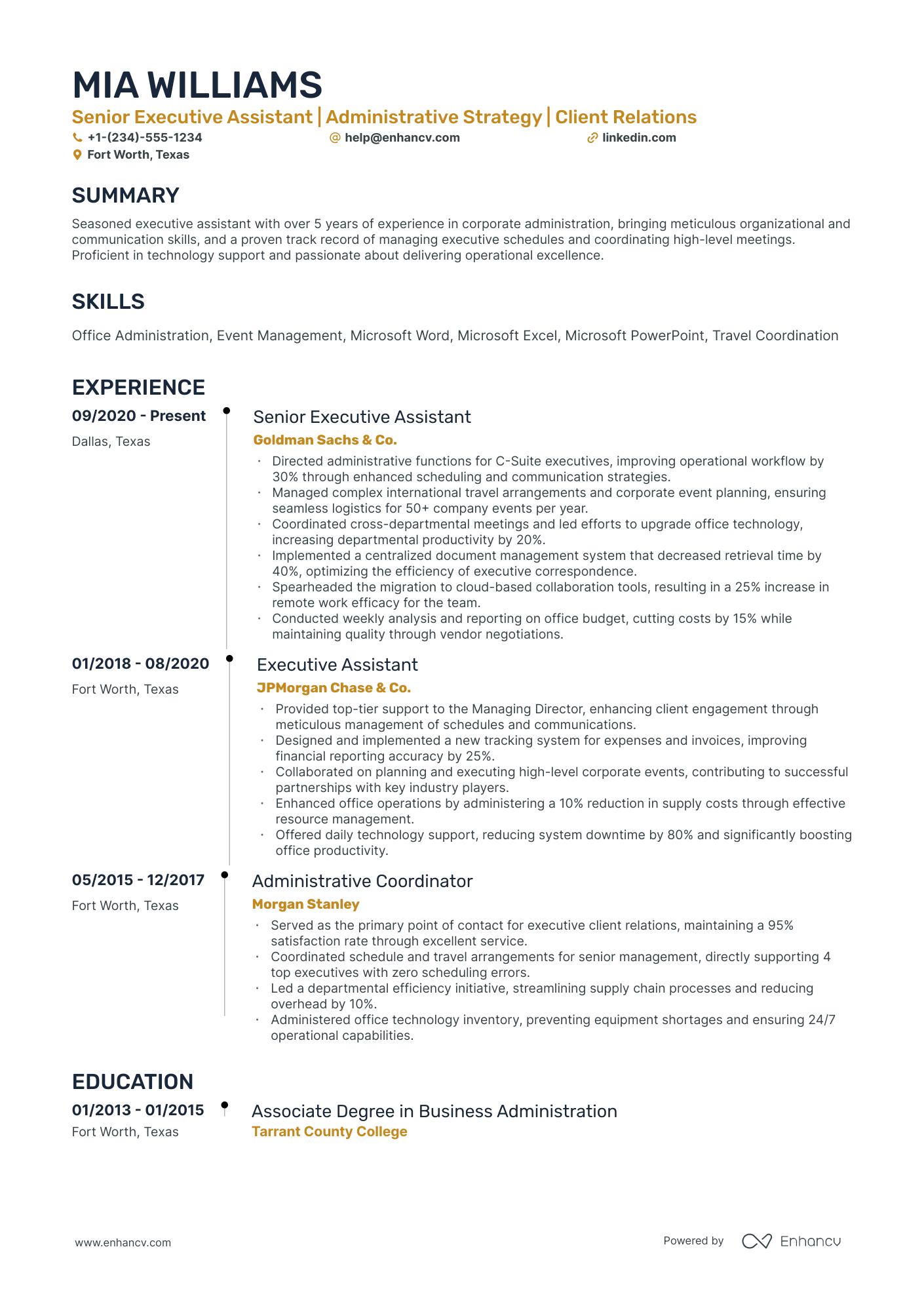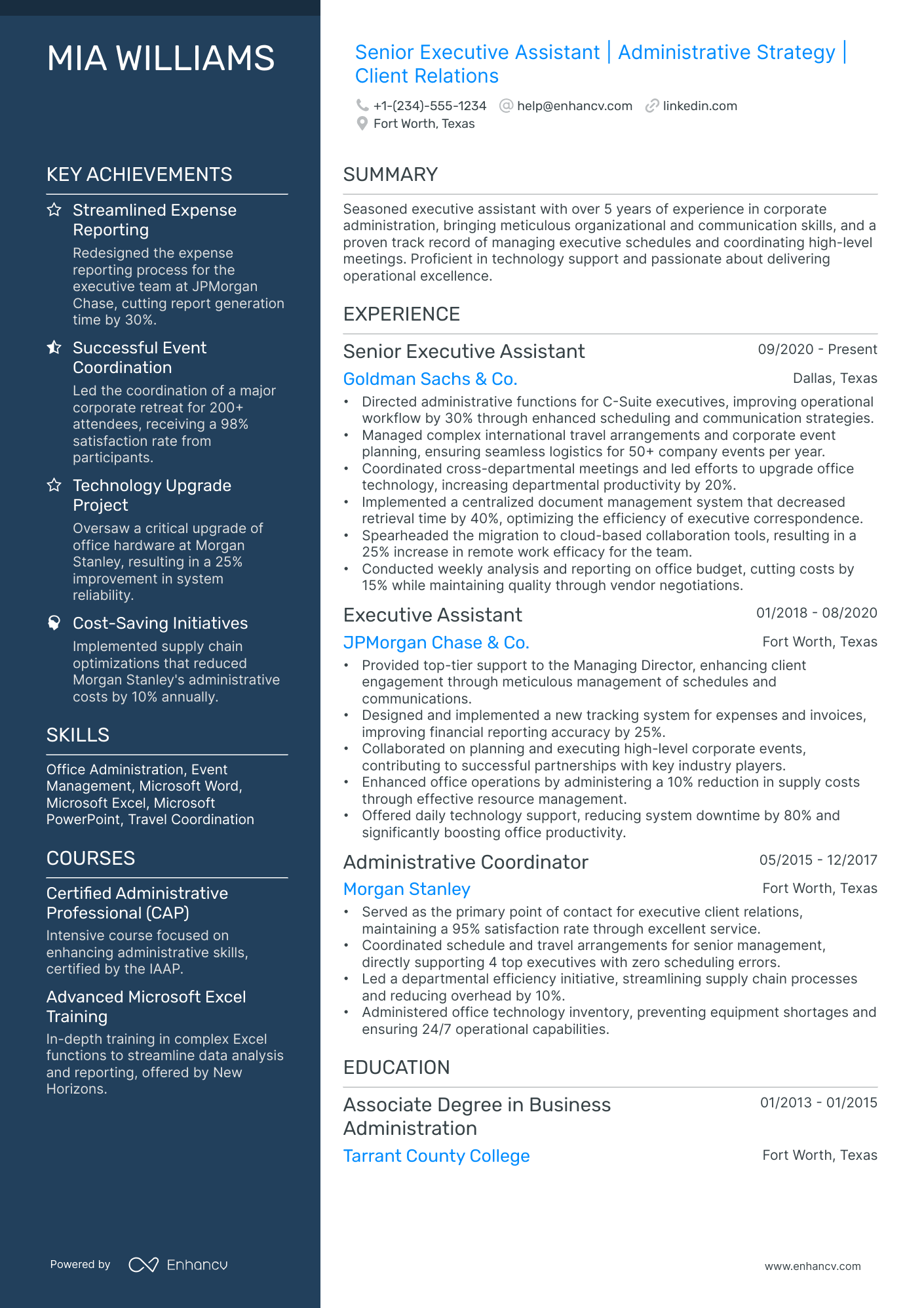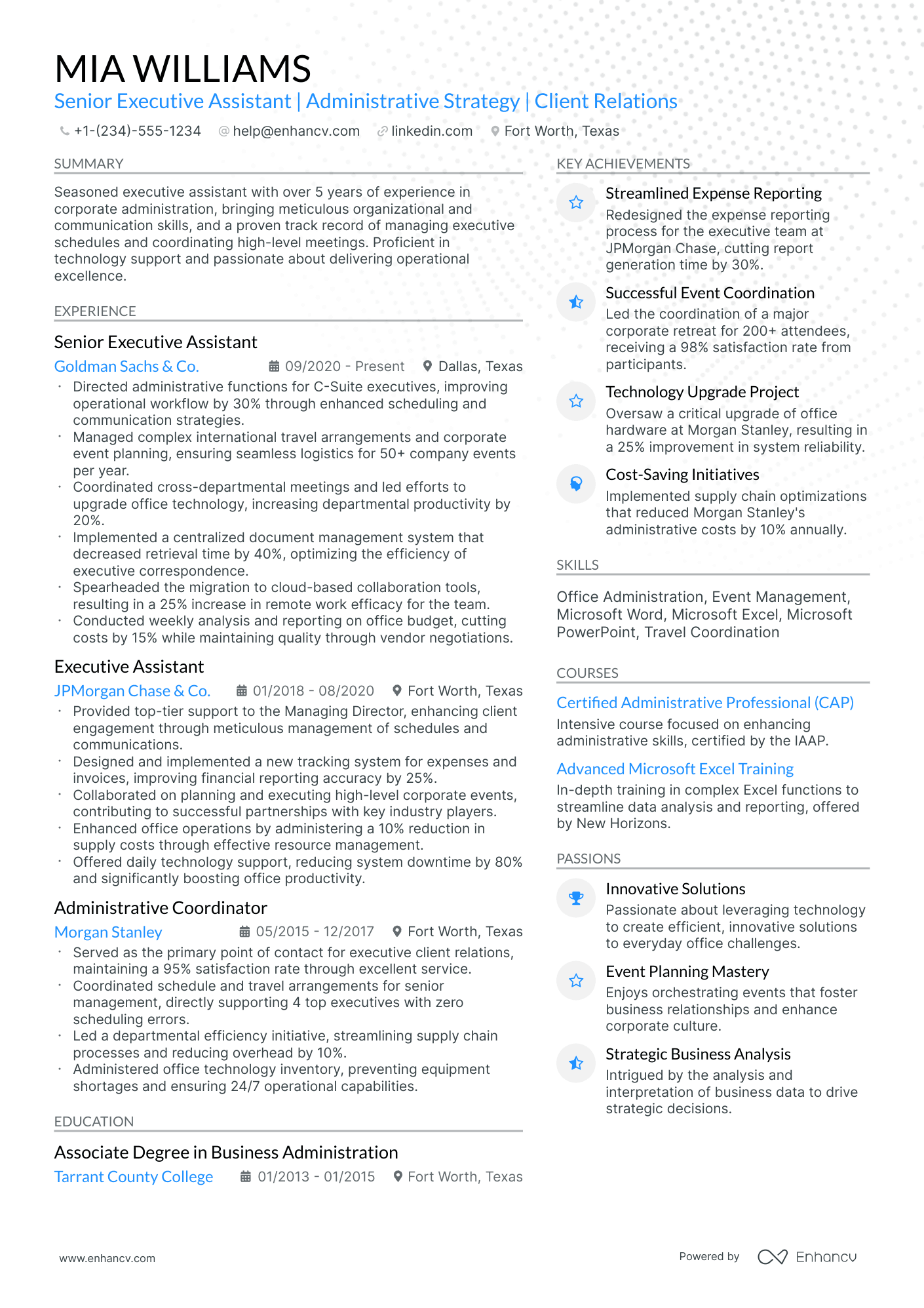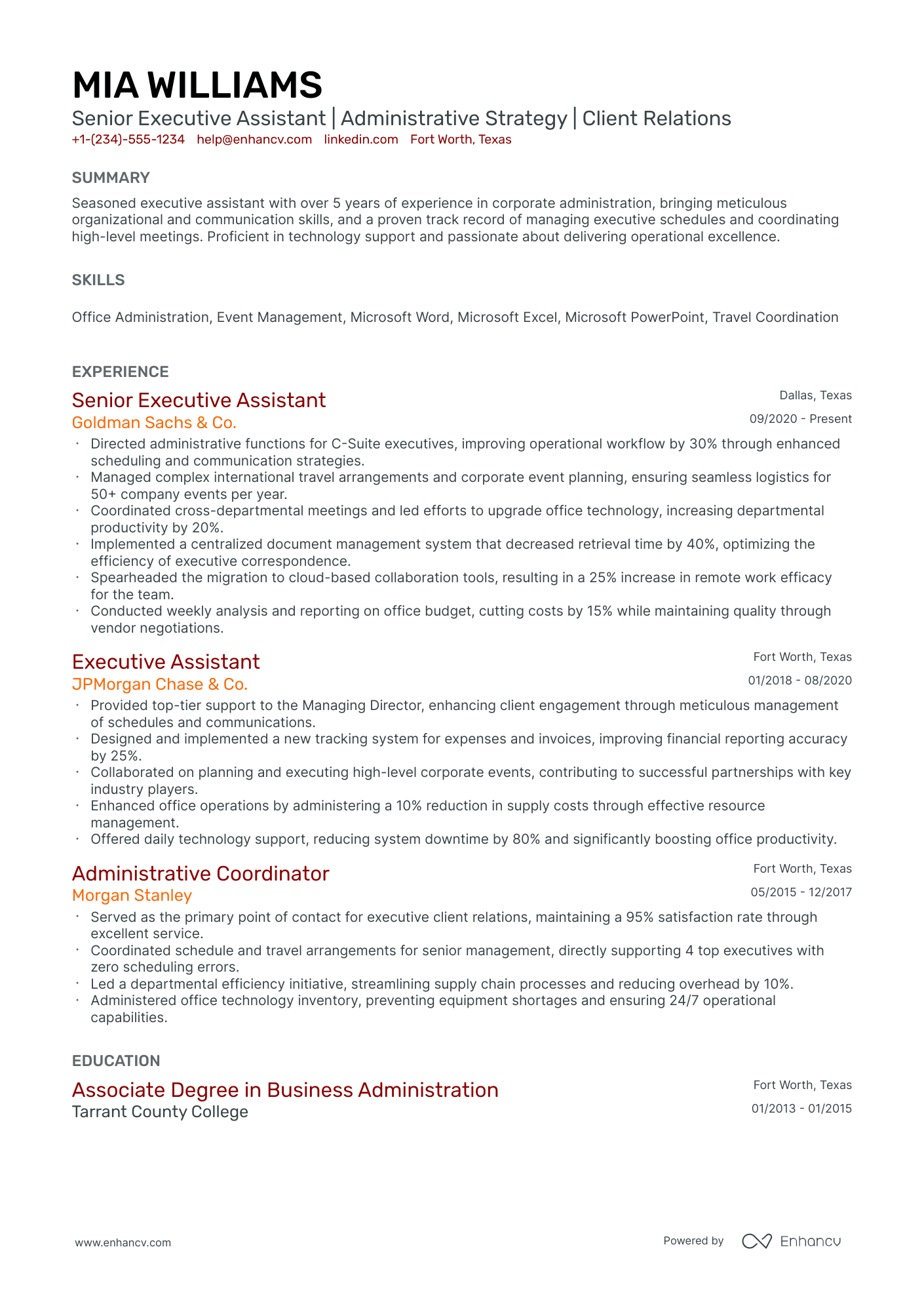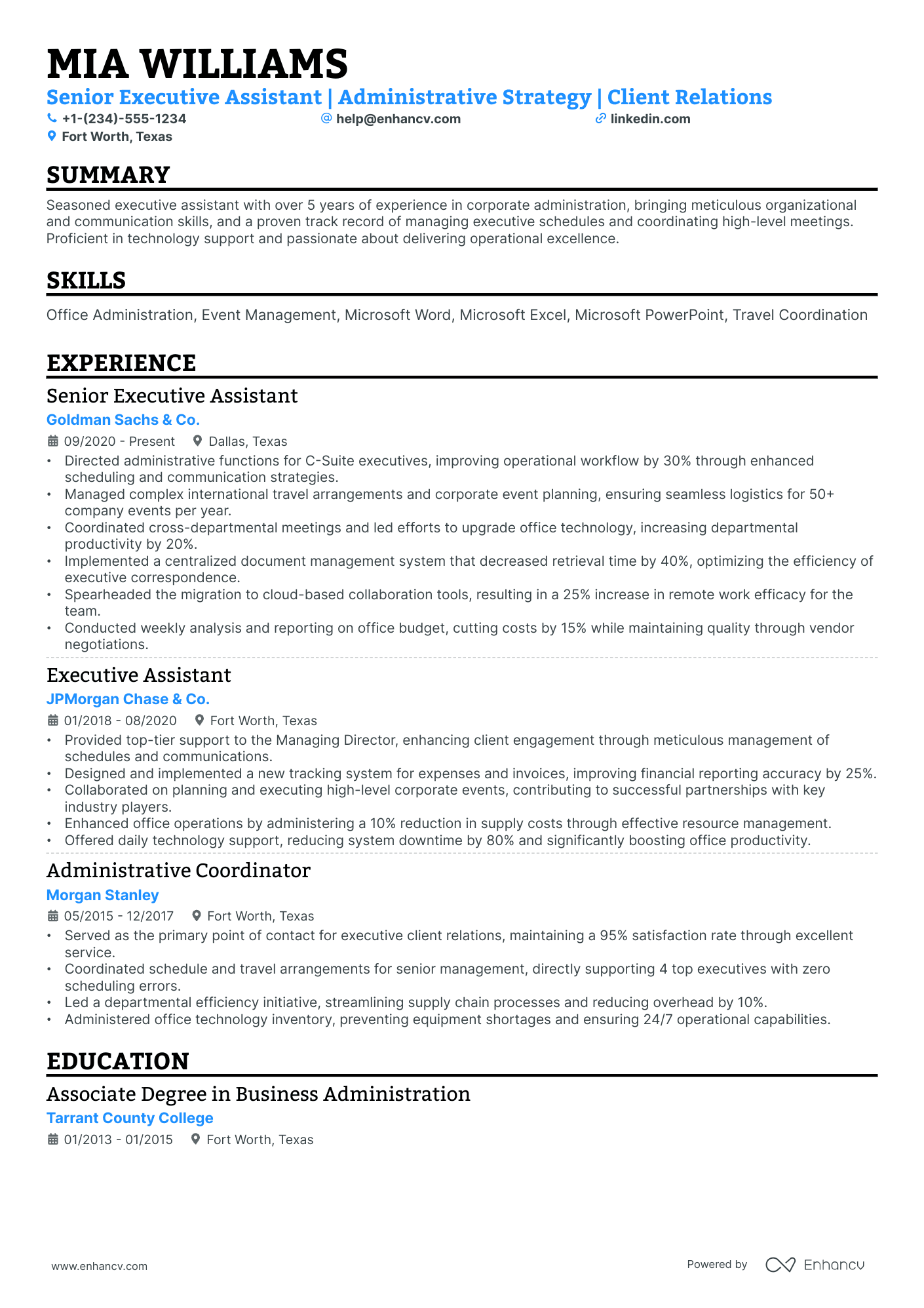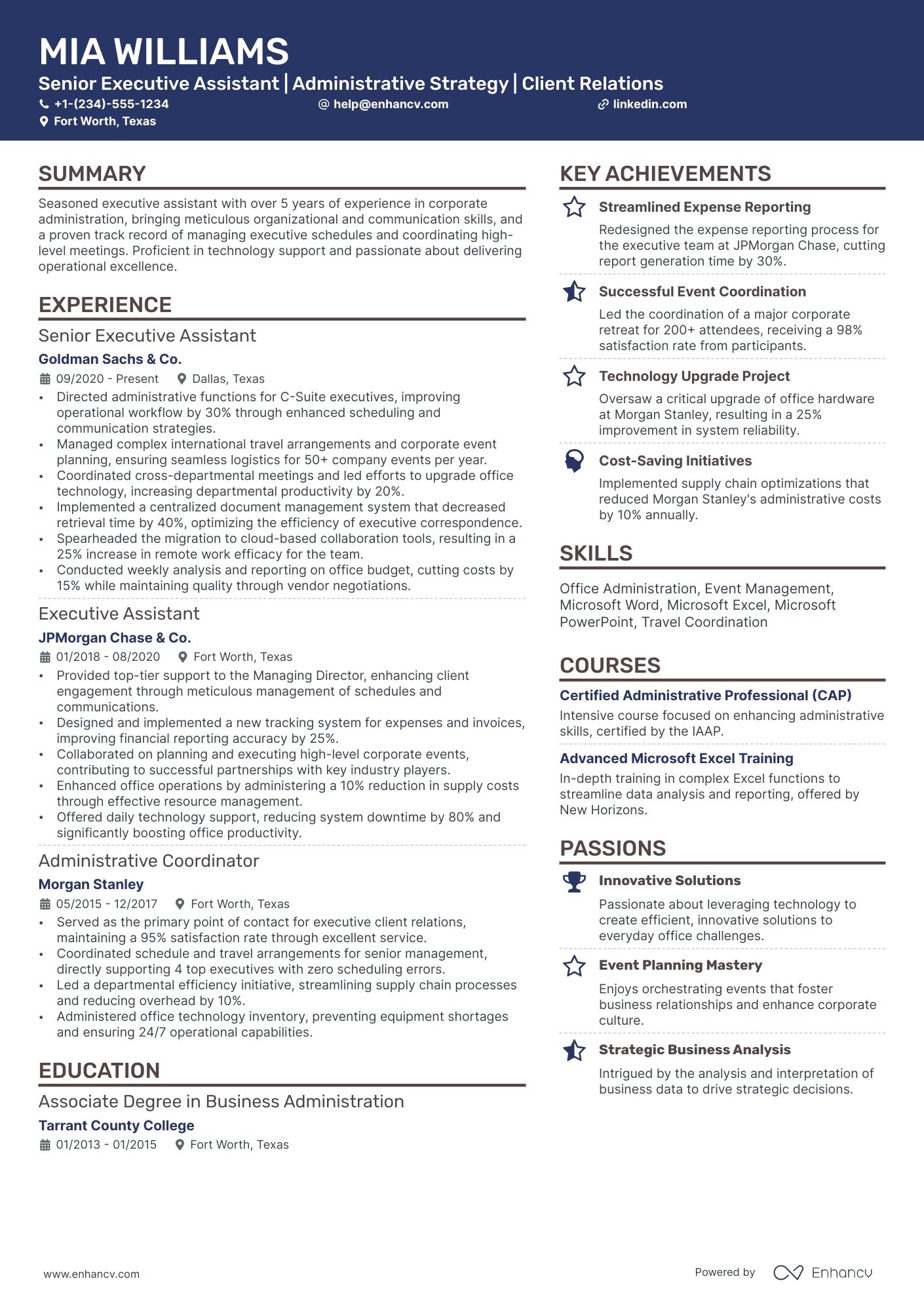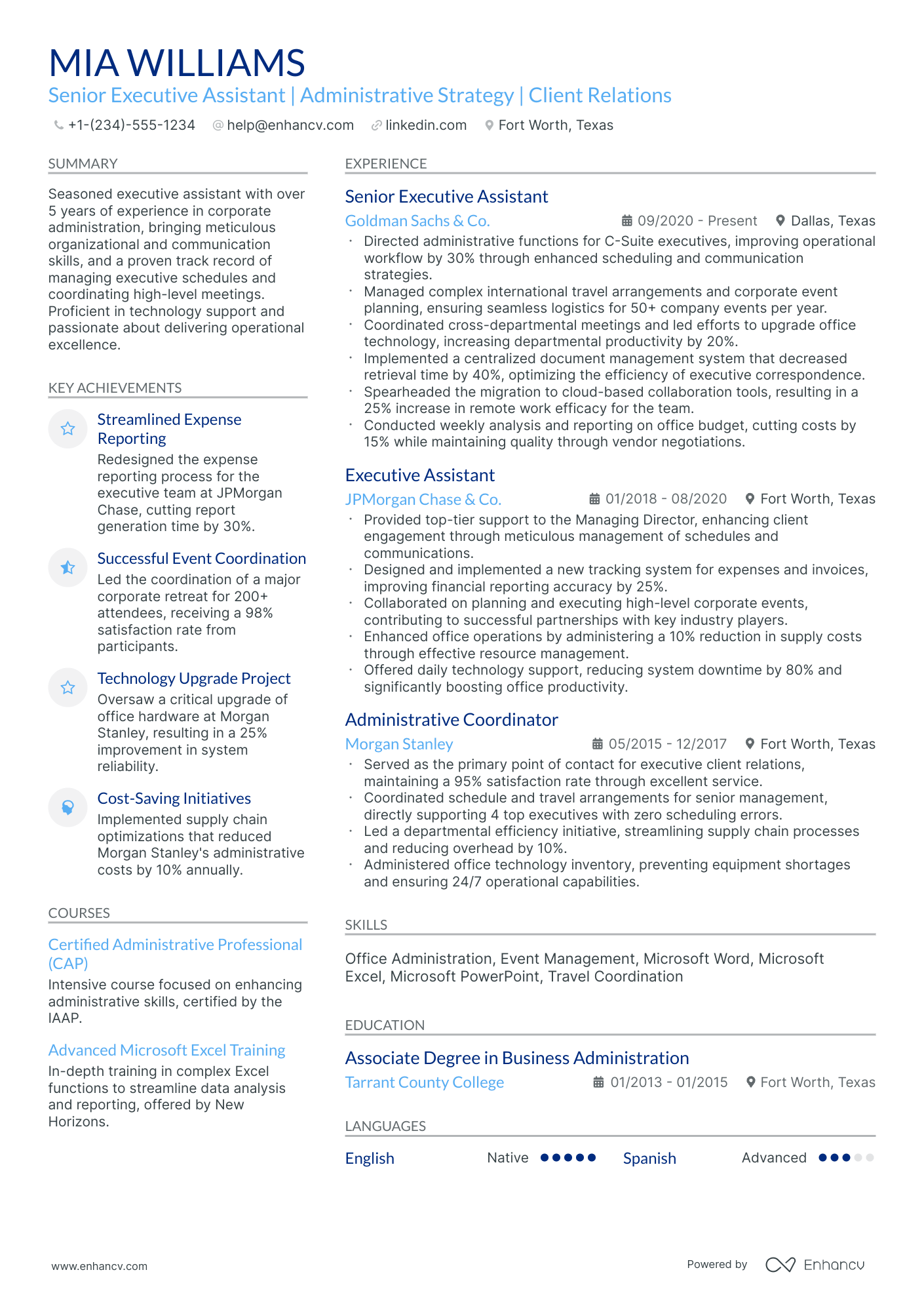Crafting a resume for corporate banking often challenges applicants with illustrating a complex blend of analytical skills and client management expertise. Our comprehensive guide will walk you through each step, ensuring you effectively showcase both your quantitative acumen and your relationship-building prowess to stand out to recruiters.
- Sample industry-leading examples to learn how to write your best resume yet.
- Improve the experience, education, and achievements section of your resume with insights from resume-writing professionals.
- Curate your technical expertise and personality to stand out amongst the pool of candidates.
- Succinctly focus on your unique skill set all through your corporate banking resume.
If the corporate banking resume isn't the right one for you, take a look at other related guides we have:
Simple guide to your corporate banking resume format and layout
Successful corporate banking resumes all have one specific characteristic - candidates have invested in a simple resume layout . One that is easy to read, makes a good first impression, and is adapted to their professional experience. There are three distinct resume formats to help you focus on your:
- professional experience - use the reverse-chronological resume format;
- skills and achievements - via the functional skill-based resume format;
- both experience and skills - with a hybrid resume format .
What is more, keep in mind that your resume may be initially assessed by the ATS (Applicant Tracker System) (or the software used by companies in the hiring process). The corporate banking resumes that suit the ATS:
- have a header that includes either a role keyword or the job you're applying for;
- should be no longer than two pages;
- be submitted as PDF, unless specified otherwise.
Remember, resume layouts can vary by country – for example, a Canadian resume format could look different.
Upload & Check Your Resume
Drop your resume here or choose a file. PDF & DOCX only. Max 2MB file size.
PRO TIP
If you're in the process of obtaining your certificate or degree, list the expected date you're supposed to graduate or be certified.
Traditional sections, appreciated by recruiters, for your corporate banking resume:
- Clear and concise header with relevant links and contact details
- Summary or objective with precise snapshot of our career highlights and why you're a suitable candidate for the corporate banking role
- Experience that goes into the nuts and bolts of your professional qualifications and success
- Skills section(-s) for more in-depth talent-alignment between job keywords and your own profile
- Education and certifications sections to further show your commitment for growth in the specific niche
What recruiters want to see on your resume:
- Experience in managing corporate client relationships and a track record of successful cross-selling of banking products (loans, treasury services, trade finance, etc.)
- Strong understanding of corporate financial statements, credit analysis, and risk assessment pertaining to corporate lending.
- Demonstrated ability to structure complex financial solutions to meet the bespoke needs of corporate clients.
- Familiarity with regulatory requirements, compliance, and legal aspects of corporate banking transactions.
- Proven negotiation skills and the ability to close deals with large corporate clients, showing a history of meeting or exceeding revenue targets.
The corporate banking resume experience section: a roadmap to your expertise
The resume experience section provides you with an opportunity to tell your professional narrative.
Recruiters, reading between the lines of your resume, use the experience section to better understand your unique skill set, accomplishments, and what unique value you bring about.
Discover five quick steps on how to write your experience section:
- Curate only relevant experience items to the role and include the company, description, and dates; all followed by up to six bullets per experience item;
- Each experience item should feature tangible results of your actions - if you can include a number or percent, this will further highlight your aptitude;
- If you've received any managerial or customer feedback, use short excerpts of it as further social proof of your technical or people skills;
- Make sure you're using the appropriate verb tense when listing your responsibilities;
- Within the description for each role, you could summarize your most noteworthy and relevant achievements.
Now, take note of how a real-world corporate banking professional received opportunities at industry leaders with these resume experience sections:
- Directed a team to develop a financial model that improved the debt structuring process, increasing efficiency by 30%.
- Managed relationships with key corporate clients, leading to a 25% increase in loan volume for the fiscal year 2019.
- Led the successful negotiation and closing of a $50 million syndicated loan for a major manufacturing client, enhancing the company's market presence.
- Facilitated cross-border transactions totaling over $100 million, optimizing international investment strategies for corporate clients.
- Played a pivotal role in the underwriting process for mid-market companies, with a focus on compliance and risk mitigation leading to a reduction in non-performing assets by 20%.
- Developed and executed bespoke financing solutions tailored to the complex needs of energy sector clients.
- Implemented a customer-centric approach that contributed to a 15% improvement in customer satisfaction scores among corporate clients.
- Managed a $200 million commercial loan portfolio, consistently maintaining a default rate of less than 1% through meticulous credit analysis.
- Spearheaded the adoption of financial technologies that streamlined payment processing for corporate clients, ultimately reducing transaction times by 40%.
- Executed industry-specific financial advisory services which resulted in a significant expansion of the healthcare and pharmaceuticals portfolio.
- Pioneered a risk management strategy that fortified the bank's loan portfolio during an economic downturn, outperforming sector averages.
- Cultivated and maintained a network of strategic partnerships that led to a 35% growth in the corporate banking client base.
- Developed comprehensive capital structure models that supported clients in optimizing their balance sheets and improving their creditworthiness.
- Orchestrated a collaborative effort with investment banking peers to deliver a complex merger financing package valued at $80 million.
- Conducted rigorous financial due diligence for corporate client acquisitions, ensuring profitable investment decisions and enhancing portfolio quality.
- Tailored international trade finance solutions for import/export businesses, driving a 50% growth in trade finance product utilization.
- Coordinated with the bank’s treasury division to develop innovative cash management services that improved clients' treasury operations.
- Led a strategic analysis for restructuring non-performing corporate debt, which recuperated 90% of previously at-risk capital.
- Initiated and maintained a portfolio of high-value clients with complex banking requirements, enhancing the bank's competitive edge in the corporate sector.
- Designed tailored lending programs that addressed the unique needs of emerging technology startups, facilitating a new revenue stream for the bank.
- Championed the digital transformation of the corporate banking services, leading to a 25% increase in digital channel sales.
- Oversee corporate client portfolio risk by developing enhanced Credit Risk Models, reducing loan loss provisions by 10% within a year.
- Delivered financial guidance to C-suite executives of mid to large-sized corporations, resulting in four clients successfully launching IPOs.
- Implemented a sector-based approach for the corporate banking division, aligning financial solutions with industry trends and generating a 20% uptick in cross-sell opportunities.
Quantifying impact on your resume
- Include the total assets under management you've directly overseen to demonstrate financial responsibility.
- List the number of client accounts you've managed to showcase client relations and portfolio diversity.
- Indicate the percentage growth of the loan portfolio you've contributed to as evidence of sales acumen.
- Detail the amount of capital raised for clients to highlight your fundraising capabilities.
- Specify the number of cross-sales or product upsells you've successfully executed to show your marketing skills.
- Report the size of the transactions you've facilitated to underscore your deal-making expertise.
- Quantify the savings achieved through your negotiations or process improvements to reflect cost management.
- Present the numerical scores or rankings of your performance evaluations to emphasize a record of excellence.
Action verbs for your corporate banking resume
No experience, no problem: writing your corporate banking resume
You're quite set on the corporate banking role of your dreams and think your application may add further value to your potential employers. Yet, you have no work experience . Here's how you can curate your resume to substitute your lack of experience:
- Don't list every single role you've had so far, but focus on ones that would align with the job you're applying for
- Include any valid experience in the field - whether it's at research or intern level
- Highlight the soft skills you'd bring about - those personality traits that have an added value to your application
- Focus on your education and certifications, if they make sense for the role.
Recommended reads:
PRO TIP
If you happen to have plenty of certificates, select the ones that are most applicable and sought-after across the industry. Organize them by relevance to the role you're applying for.
Key hard skills and soft skills for your corporate banking resume
At the top of any recruiter corporate banking checklist, you'd discover a list of technical competencies, balanced with personal skills.
Hard or technical skills are your opportunity to show how you meet the essential responsibilities of the role. The ability to use a particular job-crucial technology or software would also hint to recruiters whether you'd need a prolonged period of on-the-job training - or you'd fit right in the job.
But to land your dream role, you'd also need to demonstrate a variety of soft or people resume skills . Employers care about soft skills as they show how each candidate would fit into the team and company culture.
Both types of skills are specific and to best curate them on your resume, you'd need to:
- Create a skill section within which you showcase your hard and soft skills and present how they help you succeed.
- List specific examples of projects, tasks, or competitions, within which your skill set has assisted your results.
- Soft skills are harder to measure, so think about situations in which they've helped you thrive. Describe those situations concisely, focusing on how the outcome has helped you grow as a professional.
- Metrics of success - like positive ROI or optimized workplace processes - are the best way to prove your technical and people skills.
Take a look at some of corporate banking industry leaders' favorite hard skills and soft skills, as listed on their resumes.
Top skills for your corporate banking resume:
Credit Analysis
Financial Modeling
Risk Management Software
Loan Underwriting
Commercial Lending
Excel for Financial Analysis
Regulatory Compliance Tools
Customer Relationship Management (CRM) Software
Data Analysis Tools
Portfolio Management Systems
Communication Skills
Negotiation Skills
Analytical Thinking
Problem-Solving
Attention to Detail
Time Management
Team Collaboration
Client Relationship Management
Adaptability
Ethical Judgment
PRO TIP
Bold the names of educational institutions and certifying bodies for emphasis.
Showcase academic background with education and certifications' sections
Listing your education and certifications should be a rudimentary part of your resume writing.
Including your relevant academic background - in the form of your higher education degree and niche-specific certificates - will prove knowledge of the industry.
For your education section:
- Start by including your degree, followed by start and graduation dates, as well as the institution;
- You could include relevant coursework, major/minor , or GPA, only if your've just graduated from college or if this information would further support your application;
- If you have an "ongoing" degree, you can still list it in case you think your diploma can impress recruiters or it's required;
Follow a similar logic for your certifications section by listing the institution, alongside dates you've obtained the certificate. For some of the most recent and relevant industry certificates , check out the next part of our guide:
The top 5 certifications for your corporate banking resume:
- Certified Treasury Professional (CTP) - Association for Financial Professionals
- Chartered Financial Analyst (CFA) - CFA Institute
- Certified Bank Auditor (CBA) - Bank Administration Institute
- Financial Risk Manager (FRM) - Global Association of Risk Professionals
- Credit Risk Certification (CRC) - Risk Management Association
PRO TIP
Highlight any significant extracurricular activities that demonstrate valuable skills or leadership.
Recommended reads:
Corporate banking resume summary or objective? the best choice is based on your experience
If you're wondering about the relevancy of the resume summary or the resume objective to your corporate banking application - here's the truth.
The summary and objective provide recruiters with your expertise and accomplishments at a glance, within an up-to-five-sentence structure.
The difference is that the:
- Resume objective is also more focused on emphasizing your career goals. The objective is the perfect fit for (potentially more junior) candidates who'd like to balance their relevant experience with their career goals.
- Resume summary can provide you with space to also detail the unique value of what it's like to work with you. Corporate banking candidates who have many noteworthy accomplishments start from the get-go with their summary.
Ensure that either type of resume introduction presents your corporate banking expertise in the best light and aligns it with the job advert.
The more details you can provide with numbers, the more compelling your resume summary or objective will be.
Real-world corporate banking candidates follow these frameworks in writing their resume summaries and objectives.
The end results are usually as such:
Resume summaries for a corporate banking job
- Seasoned corporate banking professional with over 15 years of experience managing high-value accounts for a leading multinational bank. Expertise in complex financial analysis, risk management, and strategic investment decisions. Recognized for successfully negotiating a multi-billion dollar merger that significantly enhanced market share and profitability.
- Dynamic financial strategist with a solid 12-year track record at a top-tier investment bank in New York. Proficient in developing tailored banking solutions for Fortune 500 companies, with a focus on sustainable growth. Pivotal in securing a landmark international finance deal, elevating the firm's global standing.
- Accomplished project manager in the construction industry looking to leverage extensive experience in budgeting and strategic planning to transition into corporate banking. Adept at leading cross-functional teams and implementing cost-saving initiatives, aiming to apply these skills to drive financial success for corporate clients.
- Renowned attorney with 10 years of experience in commercial litigation seeking to transition into corporate banking. Possessing a sharp acumen for negotiation and risk assessment, I plan to utilize my legal expertise to help financial institutions navigate complex compliance environments and optimize their corporate banking operations.
- Aspiring to begin a career in corporate banking, bringing a recent MBA finance degree and a passion for financial markets. Eager to develop expertise in loan portfolio management and investment strategies by contributing to the success of the bank's corporate clients while honing my skills in a dynamic environment.
- Recent finance graduate determined to embark on a career in corporate banking; committed to learning the intricacies of financial analysis and client relations. My objective is to deliver value through diligent market research and the application of emerging financial technologies, while growing alongside a reputable banking institution.
Optimize your resume summary and objective for ATS
Drop your resume here or choose a file.
PDF & DOCX only. Max 2MB file size.
More sections to ensure your corporate banking resume stands out
If you're looking for additional ways to ensure your corporate banking application gets noticed, then invest in supplementing your resume with extra sections, like:
These supplementary resume sections show your technical aptitude (with particular technologies and software) and your people skills (gained even outside of work).
Key takeaways
At the end of our guide, we'd like to remind you to:
- Invest in a simple, modern resume design that is ATS friendly and keeps your experience organized and legible;
- Avoid just listing your responsibilities in your experience section, but rather focus on quantifiable achievements;
- Always select resume sections that are relevant to the role and can answer job requirements. Sometimes your volunteering experience could bring more value than irrelevant work experience;
- Balance your technical background with your personality traits across various sections of your resume to hint at how much time employers would have to invest in training you and if your profile would be a good cultural fit to the organization;
- Include your academic background (in the form of your relevant higher education degrees and certifications) to show recruiters that you have the technical basics of the industry covered.
